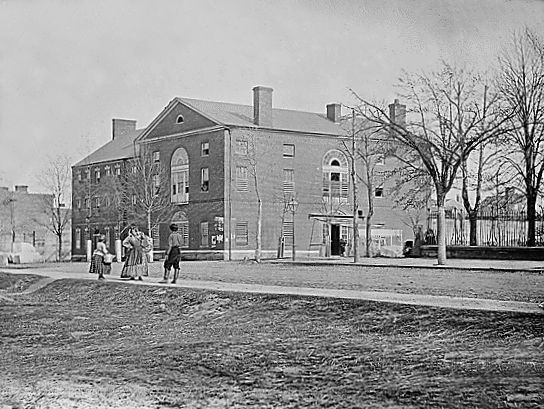143: Lincoln's Code: 1of4: The Laws of War in American History Hardcover – September 4, 2012 by John Fabian Witt (Author)

Image: United States Old Capitol Prison (https://en.wikipedia.org/wiki/Old_Capitol_Prison) , ca. 1860 - ca. 1865 Alternate Photograph: :Image:Capitolprison2.gif (https://en.wikipedia.org/wiki/Image:Capitolprison2.gif) War Department. Office of the Chief Signal Officer - National Archives and Records Administration (https://www.archives.gov/) (NAIL Control Number: NWDNS-111-B-2292) - image link (http://media.nara.gov/media/images/6/18/06-1800a.gif) Public Domain (https://commons.wikimedia.org/wiki/File:Capitolprison1.gif) Lincoln's Code: 1of4: The Laws of War in American History Hardcover – September 4, 2012 by John Fabian Witt (https://www.amazon.com/John-Fabian-Witt/e/B001JSEABC/ref=dp_byline_cont_book_1) (Author) https://www.amazon.com/Lincolns-Code-Laws-American-History/dp/1416569839/ref=sr_1_1?dchild=1&keywords=witt+lincoln%27s+code&qid=1593913678&s=books&sr=1-1 In the closing days of 1862, just three weeks before Emancipation, the administration of Abraham Lincoln commissioned a code setting forth the laws of war for US armies. It announced standards of conduct in wartime—concerning torture, prisoners of war, civilians, spies, and slaves—that shaped the course of the Civil War. By the twentieth century, Lincoln’s code would be incorporated into the Geneva Conventions and form the basis of a new international law of war. In this deeply original book, John Fabian Witt tells the fascinating history of the laws of war and its eminent cast of characters—Washington, Jefferson, Franklin, Madison, and Lincoln—as they crafted the articles that would change the course of world history. Witt’s engrossing exploration of the dilemmas at the heart of the laws of war is a prehistory of our own era. Lincoln’s Code reveals that the heated controversies of twenty-first-century warfare have roots going back to the beginnings of American history. It is a compelling story of ideals under pressure and a landmark contribution to our understanding of the American experience.